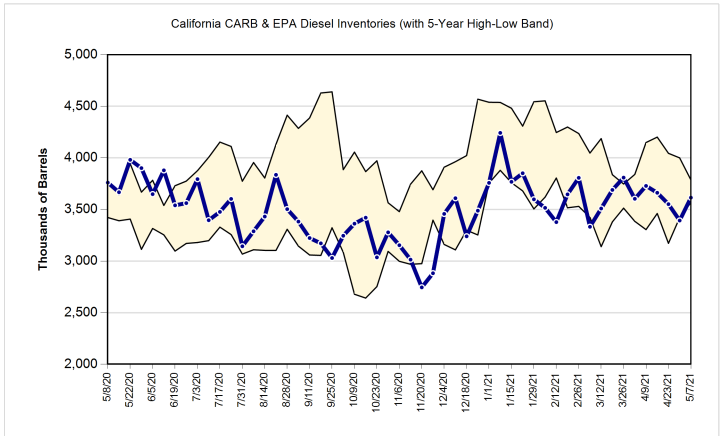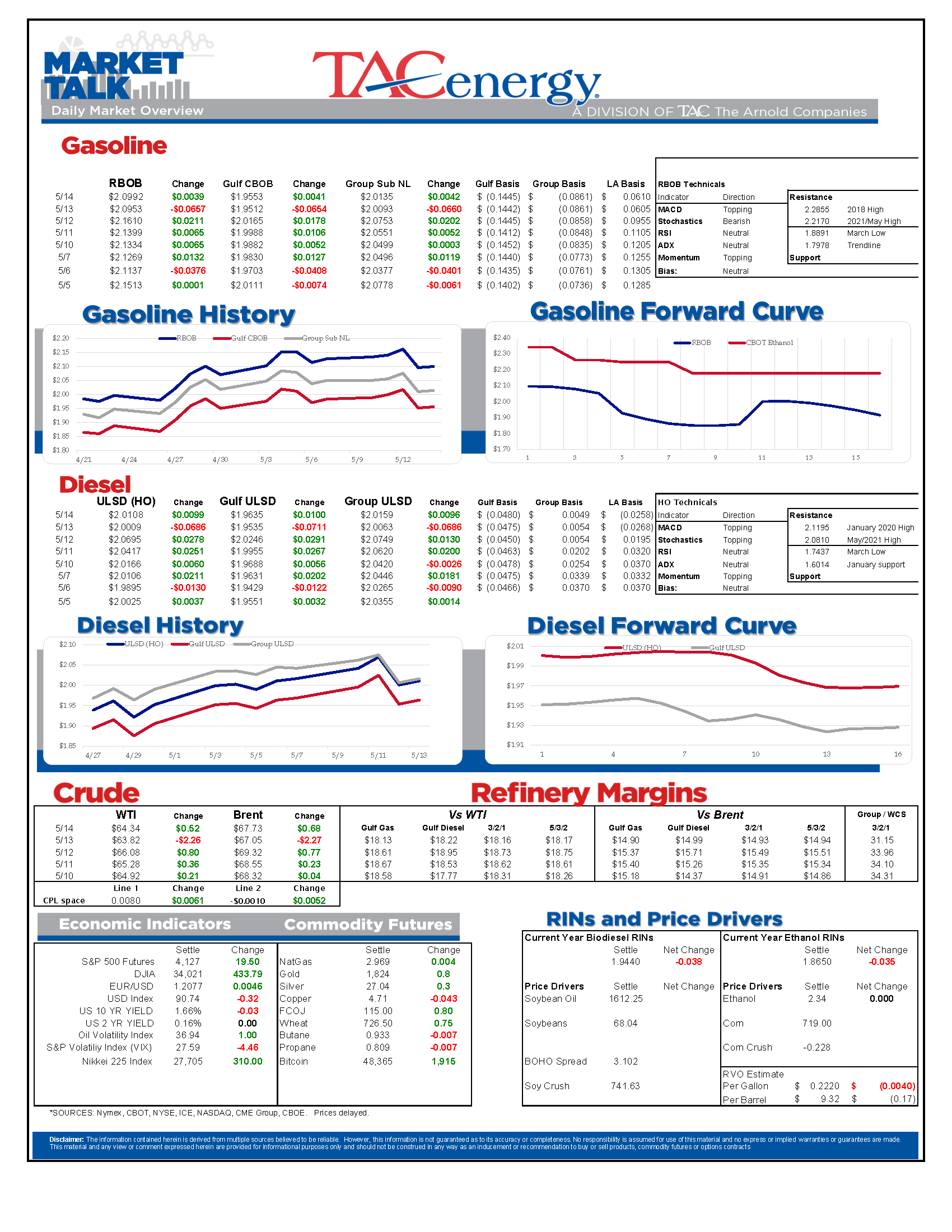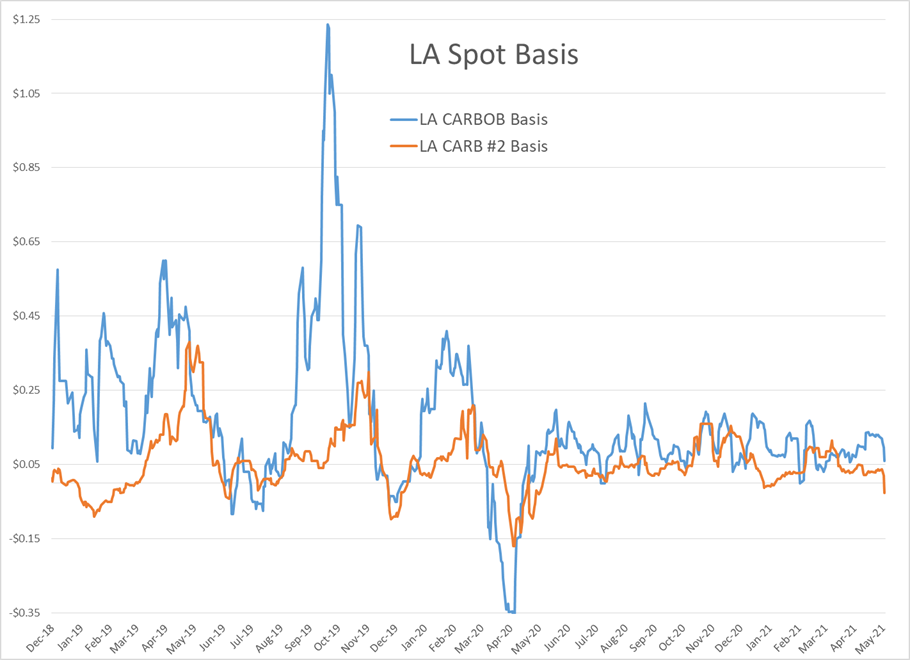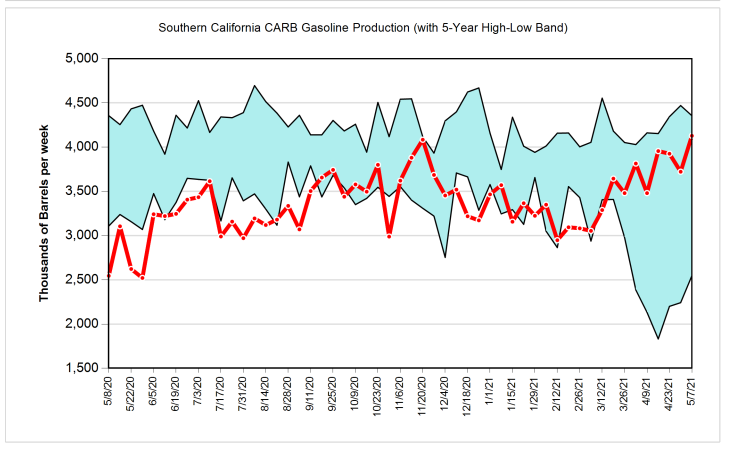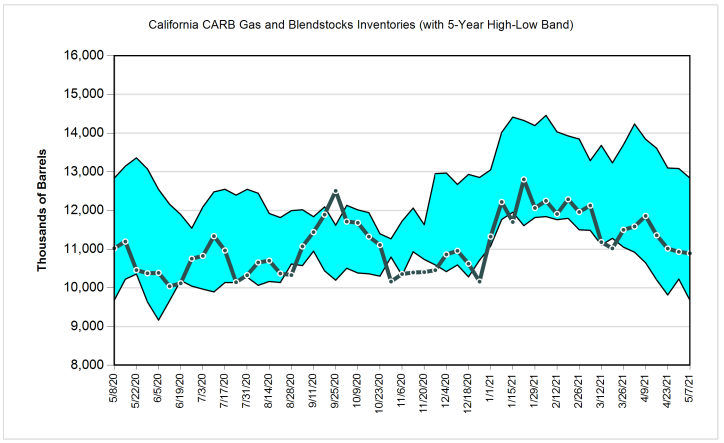Entire Pipeline System Operational Again

Colonial pipeline initiated a full restart Wednesday afternoon, and Thursday confirmed that its entire pipeline system was operational again and all markets were receiving product. The pipeline is running 5.5 days behind on average. After numerous reports guessing that Colonial did not pay the hacker’s a ransom, new reports Thursday said they did, and that the ransom was relatively low because the hackers realized they’d outkicked their coverage on this deal.
It will take another week or two to put the physical supply disruption that started a week ago today in the rear view mirror, but the futures market seems to have already moved on to other things after giving back all of the price gains it had accumulated since the shutdown during Thursday’s trading.
While most of the focus this week has been on the East Coast, the real price action has been in the West Coast, as basis values have been hammered lower, bringing spot differentials for gasoline in LA to their lowest levels in a year. Rising gasoline production in Southern California may deserve some of the credit for the move, but inventories remain near the low end of the seasonal ranges, so it doesn’t appear to be the whole story.
The Mississippi river is to U.S. grain products as the Colonial pipeline is to refined fuels. The temporary shutdown of river traffic to address damage to the I-40 bridge in Memphis, which has stranded hundreds of barges, sparked a limit-down move in several grain contracts Wednesday. Similar to the Colonial shutdown, the impacts of this shutdown are expected to be short lived, but based on what we saw earlier this week that may not be enough to prevent hoarding of bourbon and frosted flakes. The shut down of river traffic could also cause some refined product tightness for the handful of terminals north of Memphis that are fed via barge from origin points south of the closure.
RIN values did see some relatively modest selling pressure as grain and fuel prices were both taking big steps lower, but given the 60 cent increases in the past month, a drop of a few cents hardly moves the needle. Given the dramatic increases, we won’t need to wait long to see if this selling is the start of the end for the upward trend, or if it’s just a speedbump on the move towards $2/RIN.
For the second time in 10 years, an attempt by Platts to buy OPIS has been rejected by regulators that don’t want to allow more pricing index manipulation monopolization by the companies.
Today’s interesting read: Why a review of the TX property tax code over the next 2 years may make refining expansion projects a challenge down the road.
Another change coming to the refining landscape: Soybeans are becoming the new crude oil.
Click here to download a PDF of today's TACenergy Market Talk.
News & Views
View All
The Perceived Cooling Of Regional Tensions In The Middle East Area Attributing To The Quiet Start To Today’s Trading Session
The energy complex is drifting lower this morning with RBOB futures outpacing its counterparts, trading -.9% lower so far to start the day. The oils (WTI, Brent, heating) are down only .2%-.3% so far this morning.
The perceived cooling of regional tensions in the Middle East area attributing to the quiet start to today’s trading session, despite Israel’s seizure of an important border crossing. A ceasefire/hostage-release agreement was proposed Monday, and accepted by Hamas, but rejected by Israel as they seemingly pushed ahead with their Rafah offensive.
U.S. oil and natural gas production both hit record highs in 2023 and continue to rise in 2024, with oil output currently standing at 13.12 million barrels per day and January 2024 natural gas production slightly exceeding the previous year. With WTI currently changing hands at higher than year-ago levels, this increased production trend is expected to continue despite a decrease in rigs drilling for these resources.
Less than a week after the Senate Budget Committee’s hearing centered on the credibility of big oil’s climate preservation efforts, a major oil company was reported to have sold millions of carbon capture credits, without capturing any carbon. Fraud surrounding government subsidies to push climate-conscious fuel initiatives is nothing new, on a small scale, but it will be interesting to see how much (if any) of the book is thrown at a major refiner.
Today’s interesting read: sourcing hydrogen for refining.
Click here to download a PDF of today's TACenergy Market Talk.

Energy Contracts Are Trying To Find A Floor After Taking Their Largest Weekly Losses Of The Year So Far Last Week
Energy contracts are trying to find a floor after taking their largest weekly losses of the year so far last week.
There’s not much in the way of news yet this morning, so the modest buying is largely being blamed on reports that Saudi Arabia raised its prices for Asian and Mediterranean buyers in June, signaling that demand is strong enough in those markets to shoulder the increase.
RBOB gasoline futures have already dropped 28 cents from the high set April 12th, leading the argument that prices have peaked for the season. The 200-day moving average comes in just under $2.50/gallon this week, some 6.5 cents below current values, and helps set a pivotal chart support layer. If prices break there, there’s a strong case that we’ll see another 20-30 cents of downside, similar to what we saw this time last year.
Money managers continued to reduce their net length in NYMEX contracts last week, as WTI, RBOB and ULSD saw a net decrease of more than 17,000 contracts of speculative length. The hedge fund liquidation seems to have run its course for this latest news cycle however, as new short positions accounted for the majority of the decrease, and WTI and Brent both saw new length added by the big speculators. Money managers are now net-short on ULSD, which could be another reason to think the bottom is near if you subscribe to the theory that the bandwagon-jumping hedge funds usually are wrong.
Baker Hughes reported a decline of 7 oil rigs and 3 natural gas rigs last week, bringing the combined total rig count to its lowest level in more than 2 years. Perhaps most noteworthy in this week’s report was that Alaska saw 5 of its 14 active rigs taken offline in just 1 week. It’s not yet clear if this may have anything to do with the startup of the transmountain pipeline which will have Western Canadian crude now competing more directly with Alaskan grades.
Click here to download a PDF of today's TACenergy Market Talk.

Energy Markets Are Pointing Modestly Higher To Start Friday’s Session
Energy markets are pointing modestly higher to start Friday’s session, in a meager attempt at a recovery rally at the end of what would be the worst week in over two months if prices settle near current values. The liquidation of speculative bets placed on higher energy prices ahead of the direct conflict between Israel and Iran continues to appear to be the driver of the weakness, and we’ll have to wait and see if this modest bounce is a sign that the liquidation is over, or just a pause before it picks up again. Most contracts remain in a precarious technical position with the potential for a slide towards $70 for WTI and $2.20 for both refined products if the buyers don’t get serious soon.
Stocks are pointing sharply higher after a slowdown in job growth reported in the April Non-Farm payroll report. The BLS reported an increase of 175,000 jobs for the month, down sharply from the 315,000 jobs added in March, and the February & March estimates were revised down a combined 22,000. Both the “official” (U-3) and “real” (U-6) unemployment rates ticked up by .1% to 3.9% and 7.4% respectively. The immediate positive reaction to negative news suggest that the bad news is good news low-interest-rate junkies believe this may help the FED’s dilemma of the US economy being too strong to cut rates. The big jump in equities has not seemed to spill over into energy contracts yet, as crude and refined product contracts changed very little following the report.
San Francisco diesel basis spiked 15 cents Thursday to reach the highest level of any market in the country so far this year at 35 cents over prompt futures. While there aren’t yet any refinery upsets reported to blame the spike on, PBF is undergoing planned maintenance at its Martinez facility, and of course P66 just finished converting its Rodeo plant to RD after Marathon converted its Martinez facility in the past couple of years, meaning there are at most only 2 out of the previous 5 refineries in the region operating near capacity these days. The question now is how quickly barrels can shift north from Southern California which continues to show signs of a supply glut with weak basis values and spot to rack spreads.
PBF continued the trend of Q1 refinery earnings that were sharply lower, but still healthy by longer-term historical standards. The company noted that its Saint Bernard (the parish, not the dog) Renewables facility co-processing at its Chalmette refinery had received provisional approval from CARB to lower its CI scores and help improve the amount of LCFS subsidies it can receive. That facility is operating at 18mb/day which is roughly 86% of its capacity.
Cenovus highlighted the restart of its Toledo and Superior refineries in improved refinery run rates in Q1 2024 vs Q1 2023 and noted that it had ramped up production at units that were slowed down for economic reasons in December and January (you may remember this as the time when midcontinent basis values were trading 50 cents/gallon below futures). The company did note that the January deep freeze slowed operations at Superior, but did not mention any change in operating rates despite numerous upsets at its 50% owned Borger refinery.
Dress rehearsal for a busy hurricane season? So far there are no reports of refinery issues caused by the flooding in the Houston area this week. At this point, most of the flooding appears to be far to the north of the refining hubs on the Gulf Coast but with more storms in the forecast and 88 counties already declaring disaster status, this will be something to watch for the next few days.
Click here to download a PDF of today's TACenergy Market Talk.
